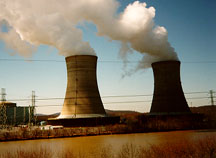Culture Melt-Down
Air Date: Week of March 26, 1999

Once the immediate danger posed by the accident passed, Three Mile Island became grist for talk show hosts and comedy troupes.
From movies and music to television and even board games, the accident at Three Mile Island quickly became part of American popular culture.
Transcript
CURWOOD: It didn't take long for the accident at Three Mile Island to become part of the American experience. To knit itself into the fabric of the nation's popular culture. In fact, the process began nearly 2 weeks before the actual incident. When Hollywood released its version of a nuclear meltdown, in a film called The China Syndrome.
(Noise in the background)
FONDA: The what?
MAN: If the core is exposed for whatever reason, the fuel heats beyond core heat tolerance in a matter of minutes. Nothing can stop it. And it melts right down through the bottom of the plant, theoretically, to China. But of course as soon as it hits ground water it blasts into the atmosphere and sends out clouds of radioactivity. The number of people killed would depend on which way the wind is blowing, render an area the size of Pennsylvania permanently uninhabitable, not to mention the cancer that would show up later.
CURWOOD: The scenario played out in the move was so similar to the reality of Three Mile Island that in retrospect the feature film is often described as documentary-like.
MAN 1: Operations.
LEMMON: This is Jack Godell. We have a serious condition. You get everybody into safety areas and make sure that they stay there.
(Hangs up)
PA SYSTEM: All personnel, proceed directly to safety areas. Caution. Code 6, this is not a drill. This is not a drill.
SNL ACTOR 1: What is happening?
(Buzzer)
SNL ACTOR 2: I'll tell you what's happening. The Pepsi Syndrome.
(Audience laughter; music and applause)
CURWOOD: Once the immediate danger posed by the accident passed, Three Mile Island became grist for talk show hosts and comedy troupes. In this Saturday Night Live spoof, a soft drink spilled on a control room panel triggers a meltdown scare at the Two Mile Island nuclear plant. With art imitating life, President Jimmy Carter visits the crippled facility and gets a little too close to the melting core.
(Buzz, shutting)
SNL ACTOR 1: Mr. President! You're glowing!
SNL ACTOR 2: Jimmy!
ACKROYD: Don't touch me! I'm a nuclear engineer and I'm pretty worried right now.
(Audience laughter; fade to music: "Takin' It To The Street")
CURWOOD: The accident at Three Mile Island also galvanized popular opposition to nuclear power. People took to the streets, and pop stars took to the stage. A group called Musicians United for Safe Energy, or MUSE, gathered for 5 nights at benefit concerts in New York City in September of 1979. The proceeds went to pro-solar organizations, as the likes of Bruce Springsteen, James Taylor, and Bonnie Raitt wailed against the perils of splitting the atom.
(Singing: "Oh... [inaudible]" "One more time!" Audience applause)
CURWOOD: Popular culture references about nuclear safety waned in the years following Three Mile Island, but they haven't disappeared.
(Theme music from The Simpsons up and under)
CURWOOD: America's favorite animated family lives in the shadow of a nuclear reactor, and its patriarch Homer Simpson, works at the plant owned by the conniving Mr. Montgomery Burns.
BURNS: Homer, they're trying to shut us down. They say we're contaminating the planet.
SIMPSON: Well, nobody's perfect.
BURNS: Can't the government just get off our backs?
CURWOOD: One of our favorite take-offs on the dos and don'ts of nuclear safety is an unofficial Three Mile Island version of the popular board game Risk.
(Suspenseful music)
CURWOOD: The object of the game, of course, is global domination. But if you roll the dice and come up with double-4s, 5s, or 6s, you melt the nuclear core and turn your territory into a wasteland.
(Nuclear explosion)
MAN: No, operator, give me the number for 911!
(Music up and under)
CURWOOD: And for this week that's Living on Earth. Next week: down but not out: the nuclear industry says it has a whole new generation of safe and inexpensive reactors ready to meet the world's energy needs.
MAN: The AP-600 is designed such that even if there were a problem, unlikely as it is, an operator could literally walk away because natural systems such as gravity will take over the whole operation.
Living on Earth wants to hear from you!
Living on Earth
62 Calef Highway, Suite 212
Lee, NH 03861
Telephone: 617-287-4121
E-mail: comments@loe.org
Newsletter [Click here]
Donate to Living on Earth!
Living on Earth is an independent media program and relies entirely on contributions from listeners and institutions supporting public service. Please donate now to preserve an independent environmental voice.
NewsletterLiving on Earth offers a weekly delivery of the show's rundown to your mailbox. Sign up for our newsletter today!
 Sailors For The Sea: Be the change you want to sea.
Sailors For The Sea: Be the change you want to sea.
 The Grantham Foundation for the Protection of the Environment: Committed to protecting and improving the health of the global environment.
The Grantham Foundation for the Protection of the Environment: Committed to protecting and improving the health of the global environment.
 Contribute to Living on Earth and receive, as our gift to you, an archival print of one of Mark Seth Lender's extraordinary wildlife photographs. Follow the link to see Mark's current collection of photographs.
Contribute to Living on Earth and receive, as our gift to you, an archival print of one of Mark Seth Lender's extraordinary wildlife photographs. Follow the link to see Mark's current collection of photographs.
 Buy a signed copy of Mark Seth Lender's book Smeagull the Seagull & support Living on Earth
Buy a signed copy of Mark Seth Lender's book Smeagull the Seagull & support Living on Earth

